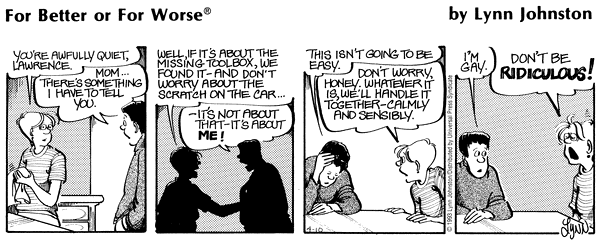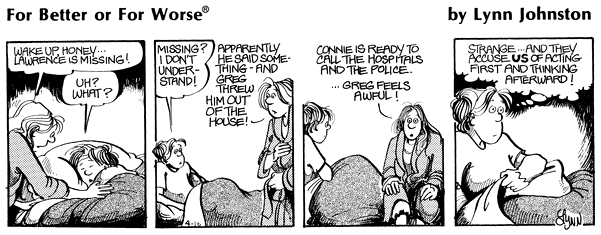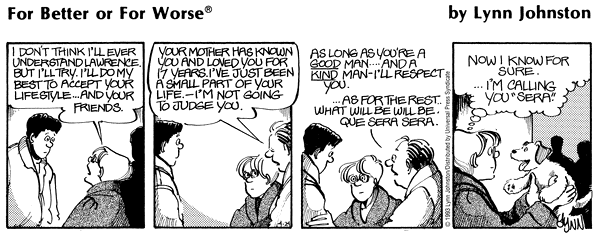General Discussion
Showing Original Post only (View all)Real "cancel culture": For Better Or For Worse, 1993 [View all]
In one of my captions for today's TOON post, I repeat a question I've asked a lot lately: "Does anybody actually use 'woke' and 'cancel culture' anymore except right-wing assholes?" They're the new favorite chew toys, only partially at the expense of the quarter-century favorite, "political correctness."
They seem to just latch onto these things to vomit bile into, long after the original contexts and people who used them in those contexts have discarded them like worn-out underwear. They were useful at the time, but reasonable people move on.
In this frame of mind, while checking on non-political cartoons that are sometimes worth including, such as Non Sequitur and Pearls Before Swine, my eyes fell on Lynn Johnston's slice-of-family-life For Better Or For Worse (now ended but in perpetual reruns). And boy, did I remember a rock-solid example of "cancel culture" in action. Real cancel culture, the right-wing kind.
In 1993, she was contemplating why one of the regular supporting characters had drifted out of use, and getting a handle on the character (Lawrence, one of the neighbor kids and childhood friend to Patterson family's son Micheal) to better include him. As she put it, "After 'being' with him for some time, I realized the reason he was having so much trouble communicating with Michael and his friends was because Lawrence, now in his late teens, was different. Lawrence was gay."
So, she came up with a four-week story where he comes out to his friend, and his mother and step-dad.
And that was simply beyond the pale for some people.
From https://www.fborfw.com/features/lawrence/index.php
Within one week, nineteen papers had cancelled For Better or For Worse outright. Editors who decided to run the series were attacked for having the gall to do so. Those who chose not to run it were accused of "censorship." Editors and publishers were damned if they did, and damned if they didn't. They called the syndicate. Editors at Universal Press worked overtime, diffusing the anger, answering questions, calming, and reassuring these people who were being harassed, picketed, and were in the eye of a storm generated by ignorance. Those editors who wished to confront me personally were given my phone number. My phone rang constantly from 7 am to 10 pm every day. I answered all my calls. I spoke with everyone who needed to know why, what was I trying to do? Did I realize what I had done?
Editors, particularly from smaller communities, were in a most uncomfortable position. In rural areas, where everybody knows everyone else, they were singled out, their children were harassed at school. One editor confessed to me that his brother was gay. He was 100 percent supportive, but if anyone in his area knew that he was in favor of running the story, he would lose his job.
The "No" Mail
It was mostly from the United States that the sound was heard. Canadian papers carried the pro and con letters on the editorial pages. There were two cancellations and a few letters came to me, but by and large, it was a southern and very religious population that responded first and loudest and with a clenched, unyielding fist.
I cannot deny that it was upsetting. When 1,000 people organized to cancel their subscriptions to a Memphis paper, one editor's bitterness came through loud and clear. I had no right to "do this" to people. This subject was best left alone. I think the letter that hurt the most, was one of the first I received. It was from a woman who said she had loved my work for years but I was now no longer welcome in her home. She enclosed about a dozen yellowed strips she had kept on her refrigerator. That made me cry.
All of this, we called the "no" mail.
But also:





